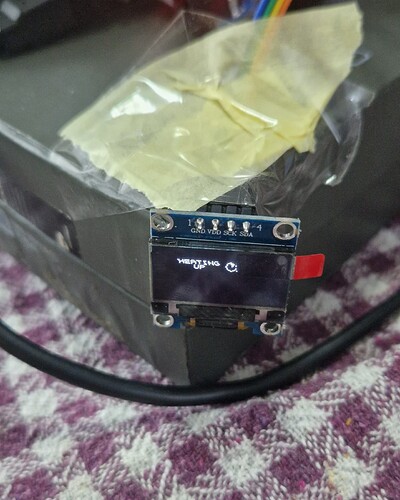Hello,
I'm trying to make replacement display for my coffee machine using Arduino. Original display was simple 59x12 pixels LED matrix controlled by 9 74HC595 shift registers. LED matrix went defective and I'm trying to make some emulator that can use OLED display for it.
Protocol is pretty simple, there are 3 pins, CLOCK, DATA, LOAD, LAST_COLUMN. Display shows one row at the time after LOAD pin is pulled to HIGH.
First 12 cycles of clock dictates the row to be shown, second 58 cycles dictates the data on that row, and last pixel on the row is lit up when LAST_COLUMN is high (that pin is not necessary since it's on very rarely). Clock is about 80 kHz, with pauses of 600uS between column data burst. (So, 70 clock pulses, 600uS pause). Since data transfer to OLED via I2C is a lot slower than 600uS, I'm dropping some frames because I can live with that. I hacked up some first version of the code, (I'm planning to send 8xRow to display once I got everything working up, and some other optimizations), which works for few seconds and then it stops. The problem is the slowness of the pin pooling which ultimately leads to de-synchronization. Do you have some idea what can be sped up here, or should I use another micro (prototyping on UNO, will put the micro in machine once everything is done). Perhaps, I should turn off the interrupts, since timer interrupt will happen once in a while. I'm reading the pin state from PORB register instead of in interrupt since for that frequency, I think the interrupt will behave more erratically.
Time between two clock pulses is 6uS, so code in state2() function should take less time than that (I don't have any profiling tools to see the actual speed, perhaps I should count machine instructions and check the manual for avr to see cycle count for each of them in that routine).
I've inlined all functions in order to not introduce the function calling overhead (put the parameters on stack, long jump, function exec, popping return address, putting result on stack, etc.)
// PIN0 - Clock
// PIN1 - Data
// PIN3 - Load
// PIN4 - COL59
#define CLK 0b00000100
#define DATA 0b00001000
#define LOAD 0b00010000
#define COL59 0b00001000
#include <U8g2lib.h>
#include <Wire.h>
U8G2_SSD1306_128X64_NONAME_F_HW_I2C u8g2(U8G2_R0,U8X8_PIN_NONE);
bool oldclk = false;
uint8_t state = 0;
uint8_t clkNum = 0;
uint8_t rowNum = 0;
char disp[96]; //display memory
void setup() {
for (int i = 0; i < 96; i++) {
disp[i] = 0x00;
}
pinMode(4, INPUT);
pinMode(2, INPUT);
pinMode(3, INPUT);
u8g2.begin();
for (;;) {
switch (state) {
case 0:
state0();
break;
case 1:
state1();
break;
case 2:
state2();
break;
case 3:
state3();
break;
case 4:
state4();
break;
case 5:
state5();
break;
}
}
}
// new display frame
inline void state0() {
while (true)
if (PIND & LOAD) {
state = 1;
clkNum = 0;
oldclk = 0;
break;
}
}
// first row
inline void state1() {
while (true) {
uint8_t clk = PIND & CLK;
if (clk && !oldclk) {
clkNum++;
if (PIND & DATA) {
if (clkNum == 12) {
state = 2;
rowNum = 12;
clkNum = 0;
break;
} else {
state = 0;
break;
}
}
}
oldclk = clk;
}
}
// read pixels in row
inline void state2() {
while (true) {
uint8_t clk = PIND & CLK;
if (clk && !oldclk) {
char pixel = (PIND & DATA) >> 3;
uint8_t byteIdx = (12 - rowNum) << 3 + clkNum >> 3;
uint8_t bitIdx = 7 - clkNum % 8;
if (pixel) {
disp[byteIdx] |= 1 << bitIdx;
} else {
disp[byteIdx] &= ~(1 << bitIdx);
}
clkNum++;
}
if (PIND & LOAD) {
clkNum = 0;
if (rowNum == 1) {
state = 4;
break;
} else {
state = 3;
break;
}
}
oldclk = clk;
}
}
// other rows
inline void state3() {
while (true) {
uint8_t clk = PIND & CLK;
if (clk && !oldclk) {
clkNum++;
if ((PIND & DATA)) {
state = 5;
rowNum = clkNum;
clkNum = 0;
break;
}
}
oldclk = clk;
}
}
// enough data for display
inline void state4() {
u8g2.clearBuffer();
u8g2.drawBitmap(20, 10, 8, 12, disp);
u8g2.sendBuffer();
state = 0;
clkNum = 0;
rowNum = 0;
}
// pause until end of row number payload
inline void state5() {
while (true) {
uint8_t clk = PIND & CLK;
if (clk && !oldclk) {
clkNum ++;
if (rowNum + clkNum == 12) {
state = 2;
clkNum = 0;
break;
}
}
oldclk = clk;
}
}
void loop() {
}
Here's how one column of data looks like
Current state:
Kind regards

